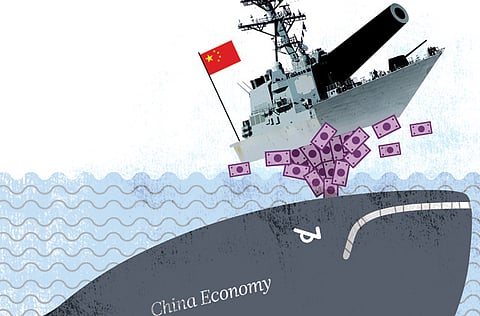China’s perilous tangle of military and economic fortunes
Stability in east Asia can no longer be taken for granted

Two debates are under way over China. The first, about Beijing’s aggression in the South and East China seas, is between naval strategists and diplomats who know little about economics. The second, about the fragility of the Chinese economy, is between economists who know little about naval strategy and diplomacy. These debates should intersect, but they rarely do. In one, China appears invincible; in the other, it seems to be on the brink of implosion.
The background to the first debate is China’s seemingly inexorable military expansion, especially in sea, air, ballistic missiles and cyber warfare. As regards sea forces, this includes not only warships but also coastguard vessels, merchant shipping and strategic deployment of oil rigs. Beijing’s ability to coordinate all these attributes of power has resulted in a subtly shifting military balance in maritime Asia. No longer does the US Navy rule the western Pacific as though it were an American lake, as it did for decades following the Second World War. Instead, there is an increasingly multipolar arrangement, with China able to intimidate Vietnam, the Philippines and Malaysia in the South China Sea, and to challenge Japan in the East China Sea.
China’s military rise has caused Japan to slip out of its quasi-pacifism and rediscover nationalism as a default option. Thus stability in east Asia can no longer be taken for granted.
The naval debate pits those who say China must be stopped against those who believe it must be accommodated. If Beijing’s naval forces continue to expand, the hardline view suggests, US allies in the region will be forced to make quiet, separate deals with China — weakening ties with the US, with vast geopolitical implications. A more sanguine view is that China’s economic growth has been so astounding in the past three decades that its military rise is natural and the US must make some room for Chinese power in the region.
Both views assume Chinese military power will keep growing. But what if — under pressure from, say, domestic political and economic stresses — it does not?
The background to the second debate is China’s overheated economy. For 30 years, double-digit growth has been the norm, but this could not go on for ever. The official growth rate of 7.5 per cent probably errs on the high side — and, even if not, growth on the more populous and developed Pacific coast is surely below that, since the poorer interior has tended to grow at a faster rate. Then there are the credit and housing bubbles; house prices fell by more than 10 per cent in the first five months of this year. The economy has, especially since 2008, been on a nonstop stimulus. To think that such a situation can continue, with China eventually surpassing the US as the world’s biggest economy, constitutes linear thinking in the extreme.
This second debate pits those who believe China’s economy will muddle through against those who think it could collapse. The muddle-through scenario assumes that China’s very capable and collegial autocrats are not in denial about any of these problems, and can act nimbly — in ways democracies cannot — to make a successful course correction. The culture of discipline and $4 trillion (Dh14.7 trillion) in foreign exchange reserves, will help. Others believe China is subject to the same economic laws as everyone else and that the leadership, as capable as it may be, is still in over its head. It is China’s very authoritarianism that undermines economic reform, they say.
What is lost in this debate is the exact degree to which China will be able to muddle through and the effect on ethnic, social and political tensions within China. Being in the economic doldrums for a few years is different from a sudden implosion. The first favours a containment of ethnic and social tensions, coupled with more aggressive nationalism on the high seas to buttress Beijing’s legitimacy in tough times. But an imploding economy could ignite ethnic warfare against the Han majority by the Tibetans and Muslim Turkic Uighurs. Such social and economic stresses could reveal the limits of China’s ability to keep increasing military spending. Here is where debates on the South and East China seas and the economy intersect. A sluggish Chinese economy leads to more aggression at sea; an absolutely terrible economy could lead to the opposite. It is the degree of weakness that matters.
While economic collapse could curb the naval threat in the western Pacific, it could also unhinge the Asian and world economies, leading to severe pain in any number of nations, including Japan, South Korea, the US, and European Union states. The world would simply be less stable.
Meanwhile, today’s maritime tensions are benign compared to what may come with a weakening Chinese economy. The naval stand-offs in the South and East China seas are the result of strong and strengthening states projecting power through expensive military platforms. And that in itself is a sign of continued prosperity in East Asia.
— Financial Times
Robert D. Kaplan is the author of Asia’s Cauldron: The South China Sea and the End of a Stable Pacific.
Sign up for the Daily Briefing
Get the latest news and updates straight to your inbox


